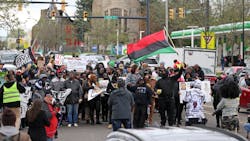Ohio PD Won't Use Tear Gas, Pepper Spray at Peaceful Grand Jury Protests
CLEVELAND—Akron officials have agreed to stop using pepper spray and tear gas on peaceful protesters demonstrating over a grand jury’s decision not to indict eight officers who fatally shot Jayland Walker.
U.S. District Magistrate Judge James Grimes Jr. on Friday signed off on the agreement between the city and attorneys for the Akron Bail Fund, an activist group that sued the city late Thursday and requested a temporary injunction.
The agreement, which will remain in effect for two weeks, followed about four hours of hearings and out-of-court negotiations between the two sides.
The injunction forces the city, its police and any other law enforcement agency to refrain from using less than lethal munitions and other excessive force against protesters, which is already barred by law.
It will, however, give Grimes the ability to call city officials into court if there’s a dispute arising from any uses of force in future protests.
The injunction says that officers can use pepper spray if protests turn violent. Other stipulations include:
- If protesters are marching on a street and an emergency vehicle — police cruiser, fire truck or ambulance — needs to get through. Police still must issue a dispersal order before deploying pepper spray.
- If protesters are blocking entrance to “critical infrastructure” such as driveways to a hospital.
Officers under the order cannot use pepper spray against protesters committing non-violent offenses, such as blocking a street or committing a traffic violation, but they can use it for violence or property crimes, according to the order read in court.
Any arrests must be made after probable cause is established, and officers must issue citations for non-arrestable offenses, like traffic infractions, the order says.
Eight Akron police officers fired 94 shots at Walker following a June 2022 police chase in which a gunshot came from Walker’s car. He ran from police, reached at his waistband and turned toward officers, who shot him 46 times. Walker did not have a weapon when he died.
A Summit County grand jury on Monday declined to indict the officers. Daily protests followed.
On Wednesday, officers from Akron police and Summit County sheriff’s deputies shot pepper spray and tear gas at protesters along Copley Road.
The Akron Bail Fund, a nonprofit that organizes protests and posts bail for those who are arrested, filed a lawsuit late Thursday, accusing officers of using excessive force to quell residents’ First Amendment right to free speech.
The accusations against the city included officers giving a dispersal order to the crowd about 30 minutes after deploying pepper spray on the crowd, which included children.
At a hearing before Grimes, Elizabeth Bonham, an attorney for the Akron Bail Fund, argued that law enforcement preemptively used force, did not have probable cause to arrest the six people who police took into custody and made pretextual stops to arrest drivers leaving protests.
“I don’t think it’s appropriate under the law for police to use chemical weapons against lawful demonstrations at all, but certainly not when there has been no instigation, no threat of violence and against people who aren’t even arguably in the street or committing a crime,” Bonham said.
John Christopher Reece, the city’s deputy law director, argued in court records and during the hearing that protesters were blocking Copley Road, causing a safety issue for police and firefighters who use the thoroughfare to cross the city and get to hospitals.
An affidavit filed by Akron Fire Chief John Natko said firefighters use Copley Road about 12 times per day on average for emergencies.
Reece said during the hearing that the city is still reviewing body camera footage and Ohio State Highway Patrol drone footage of the incident to determine what happened. He also said it’s possible that the pepper spray came from Summit County deputies, not Akron police.
Assistant Akron Law Director Brian Bremer said the city disputes that the protest was peaceful, but he did not present evidence to back up his argument, something Grimes pointed out repeatedly in the hearing.
After more back and forth, Reece said he wouldn’t object to an order stopping police from using tear gas and pepper spray against peaceful protesters.
“We can live with that,” Reece said.
Adam Ferrise covers federal courts at cleveland.com and The Plain Dealer. You can find his work here.
©2023 Advance Local Media LLC. Visit cleveland.com. Distributed by Tribune Content Agency, LLC.
